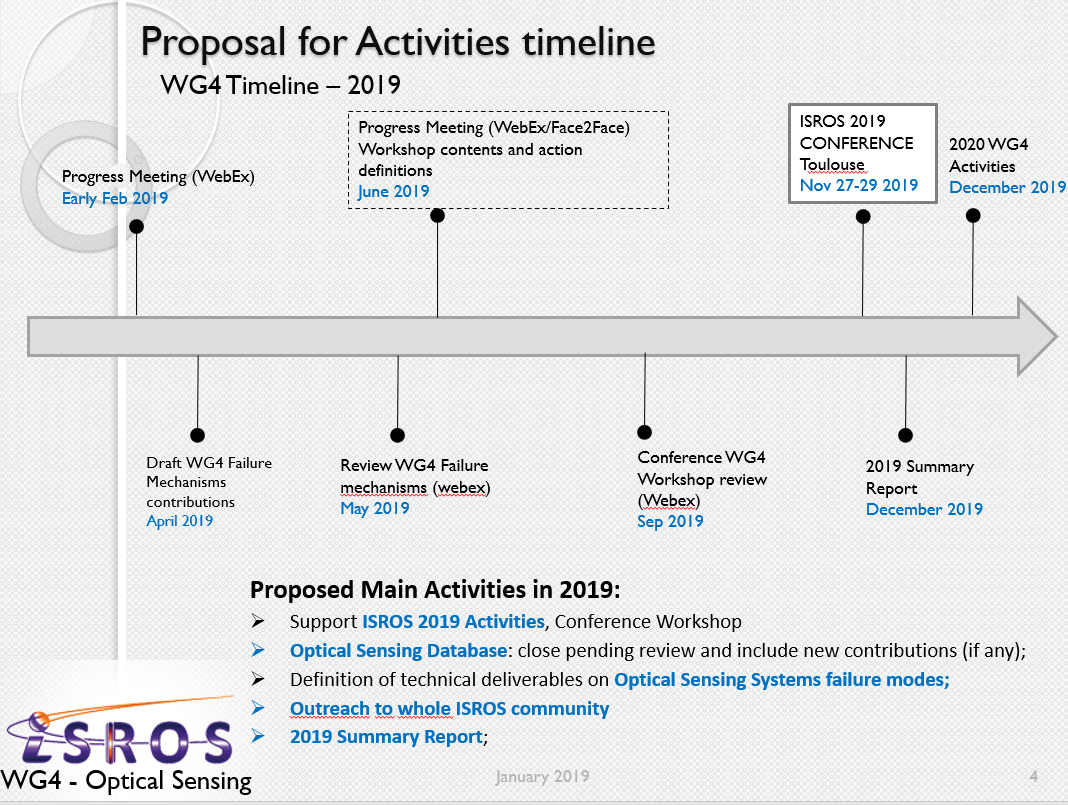Working Group
Members are welcome !
Our Mission & Vision
-Promote awareness and collaboration among ISROS members in the field of optoelectronics and its reliability
-Create and maintain Database, collecting contributions across technical areas and applications
-Develop standards – guidelines – recommendation – handbooks – Data sheets

How do we proceed
-As member you may apply to contribute the working group activities
-Contact us at contact@isros.org for more details
–Each participant is responsible for her/his company intellectual property management
-A set of documents specific to the working group activities are collected and shared among WG’s members
-WG members select documention that will be published for all ISROS members or at public level
Working Group 1 : Reliability assurance guideline for lithium niobate-based electro-optical modulators
Goals: Develop a document defining reliability assurance Guideline applicable to lithium niobate electro-optical modulators. It will define general requirements for the evaluation, the screening, the qualification and the delivery of intensity and phase
modulators packaged in hermetic or non-hermetic housings.
Contributors: CNES (Chair), Airbus D&S, Thales Alenia Space, Photline Technologies
Outcomes : Guideline
– Guidelines on E/O modulators and multichannel digital optical modules.
This document covers optoelectronic converters dedicated to short range digital transmissions, using multimode fibres
–ISROS-GL-001-V01Reliability assurance guideline for lithium niobate-based electro-optical modulators.
This document is a reliability assurance Guideline applicable to lithium niobate electro-optical modulators. It defines the general requirements for the evaluation, the screening, the qualification and the delivery of intensity and phase modulators packaged in hermetic or non-hermetic housings.
Working Group 2: Optical transceivers
Goals: Develop a document and database on Optical tranceivers.
Contributors: Airbus(Chair- Sy-Dat LE), Airbus D&S, ThalesAlenia Space, CNES, ESAE – AdvEOTec
Outcomes: European research project launching, Guideline
– CleanSky2 Project
RYTHMS :ReliabilitY of opto-Transceivers for Health Monitoring Systems
Working Group 3: Standardization
Goals: Identify recomendation and status on International standards such as handbook
Contributors: DFinder ( Chair-M-A De Smet) all members
Outcome: list
– List of existing standard
Analysis of gaps on going updated on bi-yearly basis
Working Group 4: Optical sensing
Goals: Develop technical delivrables on failure mechanisms for optical sensing technologies.
Contributors: Photonfirst (Chair – Thijs van Leest ) with 17 ISROS members
Outcomes:
– Data sheet with set of available technologies
– Failure mode under investigation – On going
– CleanSky2 Project :
ADD’ON- Advance Damage Detection through Optical sensor Network
Aim of the Activity:
- Produce a set of technical deliverables describing the typical failure mechanisms of the optical sensing technologies in the scope of WG4;
- Overall aim is to make sure this an added-value activity for all the participants;
Working Group 5: Lasers
Goals: Develop technical delivrables on failure mechanisms for lasers.
Contributors: Angelique Risson – Laurent Bechou- Olivier Gilard -Yannick – Gérald Guibaud – Alain Bensoussan
Chair to be identified ( 2023)
Outcomes: ongoing
Under construction (2023: identify participants and launch meeting.)
Working Group 6: Durability Tests
Goals: Status on International standards:
Contributors: Chair M-A De Smet (DFinder), Francois Rosala (AdVeotec) and Lipsun How (AdVeotec)
Outcomes: ongoing
Working Group 7: Optical multichannel package
Goals: Identify recomendation and status on International standards such as handbook
Contributors: Airbus DS, RADIALL, Thales alénia space, IRT Saint-Exupery
Outcomes:
Guideline ref. ISROS-GL-002-V02
Reliability assurance guideline for digital optical transmitter, receiver and transceiver modules
This document is a reliability assurance Guideline applicable to digital optical transmitter, receiver and transceiver modules. It defines the general requirements for the evaluation, the screening, the qualification and the delivery of single and multichannel devices packaged in hermetic or non-hermetic housings
